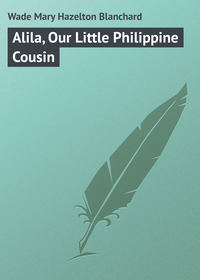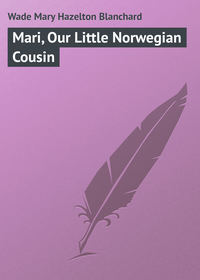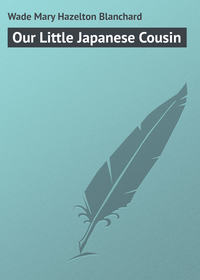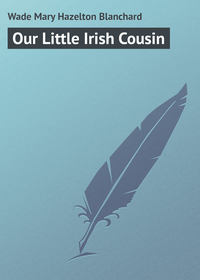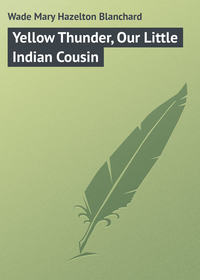 полная версия
полная версияOur Little Eskimo Cousin
Now the float can be seen on the surface of the waves, now it is dragged below as the seal dives out of sight; but Etu does not worry. He must paddle far enough away from the seal, however, to keep out of danger. For although it is usually a timid and gentle creature, yet, when it is attacked, it grows daring and dangerous.
Etu knows of several hunters whose boats have been ripped open by seals; they would have been killed by their angry foes if their comrades had not come to their rescue. The boy has listened to stories of such narrow escapes ever since he was old enough to understand these things. So he is very quick and watchful. He does not notice that his father has drawn quite close, and sits, spear in hand, ready to end the seal's life if his son should fail.
And now the wounded animal appears again directly in front of the boat. A good chance must not be lost, and Etu, seizing his spear, drives it straight through one of the flippers. It pierces the seal's lungs, and after a few gasps the beautiful soft eyes close in death.
"Well done, my boy," shouted his father. "You have won the first prize of the day. You shall treat our friends."
Now it is a custom among these people of the cold lands that when a seal is killed the successful hunter at once cuts away a portion of blubber, and divides it among the rest of the party. Etu, therefore, pulled the dead seal close to his boat, drew out the spear and harpoon, and coiled the cord attached to it. After putting these in their proper places on the deck of the kayak, he cut away the blubber, and proudly distributed the treat among the men, who by this time had drawn near. It was at least noontime, and was the first food tasted that day. Every one praised the boy's skill, and then all drew off once more to their different stations.
Before the afternoon was over, Etu's father had secured two seals, and two more were killed by others of the party. It had been a most successful hunt, although several accidents had occurred. One of the seals captured by Etu's father had succeeded in tearing the float into shreds before he was finally killed. Another of the hunters was overturned and almost drowned. This was because the cord attached to the harpoon had caught in a strap on the deck as it was running out. The wounded seal dragged him along as it plunged, before he had a chance to free his boat.
Over they went, man and boat, and only the keel of the kayak could be seen. The seal, too, was out of sight. Did it see the man? was it attacking him below the surface of the water?
Three of the man's companions paddled rapidly toward the overturned boat. One of them reached his arm down under the water and, giving a skilful jerk to the man's arm, brought him up suddenly on even keel. Another of the party cut the cord with his spear. Still a third found the paddle, of which he had lost hold, and gave it into his hands. Then all started off in pursuit of the seal as though nothing had happened.
You must ask Etu to tell you more of the wonderful doings of that first ocean hunt. He will never forget even the smallest thing which happened on that day.
It was near night when the party started homeward, and three good hours of paddling were before them. At length, however, the shore came into view. Nearer and nearer it looked to the tired workers. And yes! there were the women waiting and watching, ready for the good news.
Etu was not the first to land, for you remember he had a seal in tow, and those who are so burdened cannot travel as quickly over the water as others who have no extra weight. He travelled homeward beside his father's still more heavily laden boat; while both the man and his son pictured the mother's delight at Etu's success.
As the boats landed, one by one, the men jumped out, and started for home with their weapons. The women would draw up the boats into safe places. They would also dispose of the seals. The men's work was done, and nothing was left for them now except to sit around the oil lamp, eat, and tell stories of the day's adventures. This very night there would be a seal feast at Etu's home, and hours would be given up to eating and making merry.
CHAPTER VII.
FEAST AND FUN
It did not take long for the hunters to exchange their wet clothing for dry garments. Then with their wives and children they gathered in the home of their chief.
"How could the feast be prepared so quickly?" we ask in surprise. If we could have been there we should not have wondered very long.
The people squatted on the floor in a circle. Etu and his father stood in their midst with big knives, ready to cut up the seals lying before them. Hungry as they were, they must not eat yet. Something important must be done first.
The Eskimos have many strange beliefs. They think there is a spirit in everything, – the rock, the snow, the wind, the very air has its spirit. The seal, therefore, has its spirit, too, and must be treated respectfully.
Etu's father solemnly sprinkled water on the body, while every one watched him in silence. It was an offering to the animal's spirit. He next carefully cut away the skin and showed the thick layer of blubber beneath. The eyes of the company sparkled with delight. Many funny faces were made as each in turn received a huge chunk of raw blubber.
Please don't shudder at the thought of eating it. White travellers among the Eskimos tell us it is really very good, and tastes much like fresh cream. It is only after it has been kept for a long time that it begins to taste rancid and fishy.
After the blubber had been divided among the company, the bodies of the two seals were opened, and the blood scooped out. It seemed truly delicious to the hungry visitors. The last course of the feast consisted of the seal's ribs, which were picked until nothing was left save the bones.
How the people did eat! How they enjoyed the dainties served to them! There were many stories told by those who could stop long enough to talk. Etu was asked, over and over again, to describe how he killed his first seal. And each time the movements of his face, as well as his arms and hands, seemed to express as much as the words themselves.
At this strange feast, for which no cooking was needed, the women were not served first, as in our own land. It was the men who were first thought of, and who received the choicest pieces. But Etu did not forget his mother, and looked out to see that she was well served.
When the feast was over at last, all joined in a song. There were only a few notes, and these were repeated over and over again; but the party must have enjoyed it, or they would not have sung it so many times.
At last the moon shone down upon them, and Etu's mother hastened to draw the sealskin curtain. For her people dread the power of the moon, and do not willingly sit in its light. It is a wonderful being, and Etu has been taught that it brings the cold weather to his people. How is this possible? Why, as it dwells afar off in the sky, it whittles the tusk of a walrus. In some wonderful way the shavings are changed into the snow which falls in great sheets over the earth.
By this time the party began to think of going home. They must prepare for another "sleep," they said, and the people of the house were soon left to themselves.
Etu does not count time as we do. He speaks of a "moon" ago, instead of a month. Yesterday is the period before the last "sleep," and the years are counted by the winters. A fresh notch is cut in the wall of his winter home when the family leave it for their summer's travels. That is the only way his people have to keep account of the passing time. They do not write or read, except as they are taught by their white visitors, and Etu has never seen a book in his life.
The boy's father has shown him how to make good maps of the coast. They are very neat, and are measured so exactly that every island and point of land are correctly marked for many miles. They are drawn with the burnt ends of sticks on smooth pieces of driftwood, but if you ever visit Etu, you can trust to them in exploring the country.
On the day after the feast the other seals were divided evenly among all the people in the village. The successful hunters did not once dream of keeping them for their own families. What! have a fine dinner yourself, while others around you go hungry! It was not to be thought of. All must share alike.
CHAPTER VIII.
HARD TIMES
Time passed by. The weather was terribly cold, even for these people. The hunters went out on the ocean whenever it was safe to venture, but the seals and walruses were very scarce. They had probably gone in search of warmer waters.
At this very time their winter stores were all stolen. Whenever there is an extra supply on hand, it is hidden in a deep hole underground, so that neither wild animals nor dogs can reach it. Such a place for stores is called a caché by our western hunters and trappers.
One night Etu was wakened by a great noise outside. In a moment the whole household was aroused. They heard the dogs howling and rushing around. There was certainly a fight of some kind. Etu and his father were dressed in a moment, as well as two other men who shared the home.
"Wolves! It is a pack of wolves," cried the women. "Don't go out and leave us; it is not safe."
But the men only seized their spears and moved as quickly as possible down the passageway. They must go to the aid of the dogs, who had been left outdoors for the night. They also thought of their precious stores. The wolves had probably scented the place and were then attacked by the dogs.
In a short time the men returned to the frightened household. They were all safe. The wolves had fled, but the harm had already been done. Not a scrap of the precious stores remained. The dogs had finished what the wolves left behind them. It was the quarreling of the dogs themselves over the food that had wakened the people. It was plain, however, that the wolves had been there, because the dead body of one of them lay close by the storehouse. The dogs had been more than a match for them.
There was nothing for Etu and his people to eat that day. There was scarcely any oil in the lamps. The women and children tried to keep warm beneath the piles of furs; the men went out to search along the shore for seal holes.
Our brave little Etu looked upon himself as a man now. So, leading his brightest dog by a cord, he started out in search of prey. The dog had a wonderfully keen scent. He would help in finding the hiding-place of a seal, if there were one to be found.
You may not know what a queer home the mother seal makes for her baby. She chooses a place on the solid ice that is covered with a deep layer of snow. She scrapes away the snow and carries it down through a hole in the ice into the water below. When her work is done, she has a dome-shaped house. The floor is the icy shelf, from which there is a passageway to the water beneath. There is a tiny breathing-place in the snowy roof to which she turns when needing air.
The baby seal is born in this strange home. He lies here and sleeps most of the time till he is old enough to take care of himself. His mother often visits him. She hopes his enemies will not find him. But the bear, the fox, and the Eskimo dog, are watching for signs of just such hiding-places as these. Their scent is keen and they discover the tiny breathing-holes when men and boys would pass them by. This is why Etu took his dog along with him.
Perhaps you wonder why Etu did not let Vanya run free. He only wished him to find a seal hole; the boy would do the hunting himself. The dog, if left alone, might succeed in scaring away the old seal; and Etu wished to get both the baby and its mother.
The boy tramped for many hours. Remember, he had no breakfast this morning, yet he went with a bright face and a stout heart. When night came, Etu was still brave and cheerful, although he had met with no success. He went home and found the men just returning. They also had failed.
They could expect no supper, nor fire to warm them, after the long day's tramp in the bitter cold, but they must not show sadness; they must keep up stout hearts for the sake of the women and children.
After all, there was a surprise waiting for Etu. His mother had used the last bit of oil in thawing a little snow to give the household some water to drink. And, besides this, there was a scrap of seal hide for each one to chew. Tough as it was, it was received as though it were the greatest dainty in the world.
After this meal, if it could be called one, Etu crept into bed, and was soon sound asleep. Morning came, and our little cousin started out once more in search of food. But he had no better success than the day before. When he got home at night there was good news awaiting him, although it did not bring any supper.
His father had found a seal-hole, and had said to the other men, "I will not leave my place till I can bring food for my hungry people." They left him, and went back to the village to tell his waiting household. His good wife at once got a heavy fur robe, and sent it back to her patient husband. He could wrap it about his feet, as he sat watching in the cold.
Perhaps it would be only a short time before he would hear the mother seal blowing at the hole below. But, again, hours might pass before she would come back to nurse her baby. Yet the man must watch and be ready to pierce the breathing-hole with his long spear at any moment, – it was his only chance of killing the mother.
The long hours of the night passed; the morning, too, was gone, when, suddenly, the quick ears of the hunter heard the welcome sound. And now, a second blow! the seal's head must be close to the hole. Like a flash, down went the waiting spear, and fastened itself through the nose of the seal. If it had turned a half-inch in its course, it would have failed in its work.
There was a violent pull at the spear, as the seal darted down through the passage from her icy home to the water below. But the hunter had a long rope fastened to the spear, and he let it run out quickly. Then, brushing away the snowy roof, he jumped down on the floor of the "igloo." With two or three strong pulls he brought up the struggling seal, and quickly ended her life. It was an easy matter to dispose of the frightened baby.
What a prize he had gained! He did not think of his frost-bitten nose, nor of his empty stomach. He only pictured the joy of the waiting people when he should reach home.
When the hard-earned supper was set before them, you cannot guess what was the greatest dainty of all. It was the milk inside the baby seal's stomach! It was sweet and delicate in its taste, and was much like the milk from a green cocoanut.
There were many other hard times before that winter was over, but Etu did his part bravely, and no one died of want.
One day the boy hunted a seal bear-fashion, and was successful, too. He had learned many lessons from this wise creature, and he did not forget them. The polar bear, so strong and fierce, is also very cunning. If he discovers a dark spot far away on the ice, he seems to say to himself, "Ah! there is a seal asleep. I will deceive him, and catch him for my dinner." So he creeps, or, rather, hitches along, with his fore feet curled beneath him. Nearer and nearer he draws to his prey. And now the sleeping seal awakes. Is there danger? But the bear at once stops moving, and makes a low, strange sound. It is different from his usual voice. The seal listens, and is charmed. He turns his head from side to side, and then is quite still once more. The bear creeps nearer now; once more the seal starts, but is again charmed by the strange sound. Suddenly he is caught in those powerful claws, and the long, sharp teeth fasten themselves in his body. In a moment it is all over with the poor seal.
This is one of the lessons Etu learned from Ninoo, the bear. He followed his teacher well when one day he, too, saw a dark spot on the shore, quite a distance away. Holding his spear beneath him, he crouched down on the snow, and jerked himself along. For some time the seal was not aroused. Then, opening his eyes, he must have thought: "Is that a brother seal over there? His coat is like mine." Still he watched, for a seal is easily frightened. Etu stopped moving and lay quite still.
"No, there is no danger," thought the seal; and he closed his eyes again.
Once more Etu began to move, and drew quite near before the seal stirred again. But now the creature seemed to question himself once more.
"Is it a friend, or is it one of my terrible enemies?"
He was about to dart away when Etu began to make a low, strange sound. You would have thought it was the bear himself, he was imitated so well. The seal seemed pleased, and did not stir again.
Before another five minutes the young hunter had killed his victim. He hurried homeward with the heavy burden flung over his broad shoulders. You can imagine how proud his mother felt when he appeared in the doorway of the house and showed his prize of the morning.
CHAPTER IX.
AN ESKIMO CHRISTMAS
Not long after this Etu's people celebrated a festival. It was about Christmas time, but the boy had never heard of our own great holiday. Yet his own Christmas always means very much to him.
All the people of the village met together on a certain evening in Etu's home. The medicine-man was there, and made a sort of prayer. He prayed that all might go well with the people during the coming year. This medicine-man is the priest as well as the doctor among the Eskimos. After the prayer there was a feast. The hunters had done their best, and had managed to get a good supply of seal meat on hand.
The next day after the feast, men, women, and children gathered together in a circle in the open air. A vessel of water had been placed in their midst. Each one brought a piece of meat with him. No one spoke while it was being eaten, but each thought of his good spirit, and wished for good things. Then each in turn took a drink of water from the vessel. As he did so he spoke, telling when and where he was born.
When this ceremony was over, all threw presents to each other. They believed they would receive good things from the good spirits if they were generous at this time.
Soon after this festival came New Year's. This, too, was a strange celebration.
Two men, one of them dressed as a woman, went from hut to hut blowing out the flame in each lamp. It must be lighted from a fresh fire.
The people believe there is a new sun in the heavens at the beginning of each new year. They think they ought to picture this great change in their own homes.
The year was a moon old, as Etu would say, when one day he was out hunting for seal-holes with his father. They brought a pack of dogs along with them. These had just been loosened for a run when they darted off as though they had found a fresh scent. They rushed toward a great bank of snow on the side of a high rock.
Surely it was no seal-hole they had discovered. The small opening on the surface of the snow showed that it was the breathing-place of a polar bear. The mother bear eats vast quantities of food at the beginning of winter; then she seeks a sheltered spot at the foot of some rock, and begins her long rest. The snow falls in great drifts over her. This makes a warm, close house. Does it seem as though she must die for want of air? There is no danger of this, for the breath from her great body thaws enough snow around her to form a small room. It also makes a sort of chimney through the snow, to the air above.
The baby bear is born in this house of snow, and there he stays with his mother till old enough to hunt for himself.
It was the home of a mother bear, then, that the dogs had discovered. They were wildly excited, for Eskimo dogs are no cowards. They love a bear hunt hugely. They rushed upon the opening and quickly pushed away the snow. Etu and his father stood on the watch for the mother bear and her cub to appear. They were as much excited as the dogs, but stood with spears in hand, perfectly still.
Look out now! for here they come. What a tiny little thing the baby bear is! It is like a little puppy. It would be easy to end its life, but Etu knows that would not be safe. It would make the mother a hundred times more dangerous.
The great creature looks now in one direction, now in another. It would not be hard for her to escape; but she will not leave her cub. So she rushes madly toward Etu's father. The dogs jump around her, biting at her heels. She does not seem even to notice them. Look at the long sharp teeth as she opens her mouth for a spring upon the man. One blow of her paws would knock him senseless. But he does not fear. He jumps to one side and dodges the blow. At the same time, he strikes at her throat with his long spear.
The blood gushes forth and she staggers. However, she shakes herself together with a great effort and rises on her hind legs to strike again. The pack of dogs surround her and keep biting at her legs, but the man would not be able to escape if Etu did not suddenly come up behind. He plunges his own spear far into her side. She gives one fearful groan and falls to the ground. No hunter will ever be troubled by her again.
The poor little cub runs to its mother's side, giving piteous cries. But no one is left now to pity and love it, so its life is mercifully and quickly ended. The men and dogs are soon on their homeward way. They must get sledges and go back quickly for the bodies of the two bears. Suppose that while they were gone another party of Eskimos should come along, need they fear their prey would be stolen? The thought does not enter their heads, for such a thing has never been known to happen among their people. They are honest in all ways, and would not touch that which they believe to be another's.
CHAPTER X.
SUMMER TRAVELS
The long winter was over at last, and Etu's people got ready to leave their underground homes. They would spend the first spring days farther up the coast, and closer still to the water's side; for there they could watch the seal-holes more easily.
The household goods were packed on the sledges, and Etu said good-bye to his winter home for four months. The men walked along, guiding the dogs, while the women and children rode in the sledges. They travelled nearly all day before they came to a place where they wished to settle. But the weather was even now bitterly cold. The snow still covered the earth, and the water along the shore was a mass of broken ice.
Where were these people to be sheltered when night came on? The question could be easily answered. They would build homes for themselves in an hour or two. The sheets of snow around them were quite solid, and the boys and men began to saw the snow into thick blocks. The walls and roofs of the houses should be built of these.
Two men stood in the centre of each cleared space: the blocks of snow were handed to them. These were laid on the ground, side by side, in a circle as large as they wished the house to be. The foundation was quickly made. Then another row of snow blocks was laid above the first, but drawn in toward the centre a very little. Then came a third row, and so on, till at last there was just space enough at the top for one block of snow to fill it in completely. The new house looked like a great snow beehive.
But the two builders were shut up inside! One of the men on the outside cut a block of snow out of the wall of the house. This made a doorway through which people could go and come. It could be closed afterward, when the inmates desired, by filling it again with a snow door.
The builders now took loose snow and sifted it into the cracks and crevices to make the house quite close and tight.
After this, the floor must be trodden down smooth, and then the women could enter to set up housekeeping. A bed of snow was quickly made, over which the fur rugs were thrown. Next, a stand of snow was shaped, and the lamp set up in its place. The oil was soon burning brightly, and snow was melted to furnish drinking-water. In half an hour more our cousin Etu was eating supper as comfortably as he could wish. Not long after, he was sound asleep on his snow bedstead, without a single dream of cold or trouble.
After a few weeks of seal hunting, Etu noticed that the birds were returning. There were great numbers of them, – wild ducks, geese, and sea-birds of many kinds.


